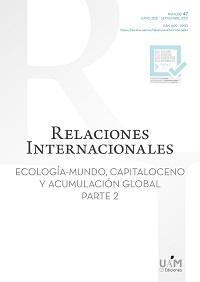Keywords:
eco-history, world-ecology, international relationsCopyright (c) 2021 Jean-Paul Deléage, Daniel Hémery; Rami Zahrawi Haj-Younes

This work is licensed under a Creative Commons Attribution-NonCommercial-NoDerivatives 4.0 International License.
Abstract
From prehistoric times human activity has transformed ecosystems. But it has been since the rise of industrial capitalism that a certain historical threshold has been reached. At the end of the Twentieth Century the creation of a world productive space implies the ecological unification of the world. The accelerated destruction of living species, pollution of the oceans, and the hole in the ozone layer threaten the planet Earth. These developments parallel previously existing environmental tensions such as deforestation and desertification. In creating a world economy, capitalism in its classical forms as well as in its « socialist » incarnations has projected societies into a new relation with nature, that of a world ecology.
Downloads
References
DELÉAGE, Jean-Paul y HÉMERY, Daniel (1989). "De l'éco-histoire à l'écologie-monde", L'Homme et la société, nº 91-92, pp. 13-30. https://doi.org/10.3406/homso.1989.2386





